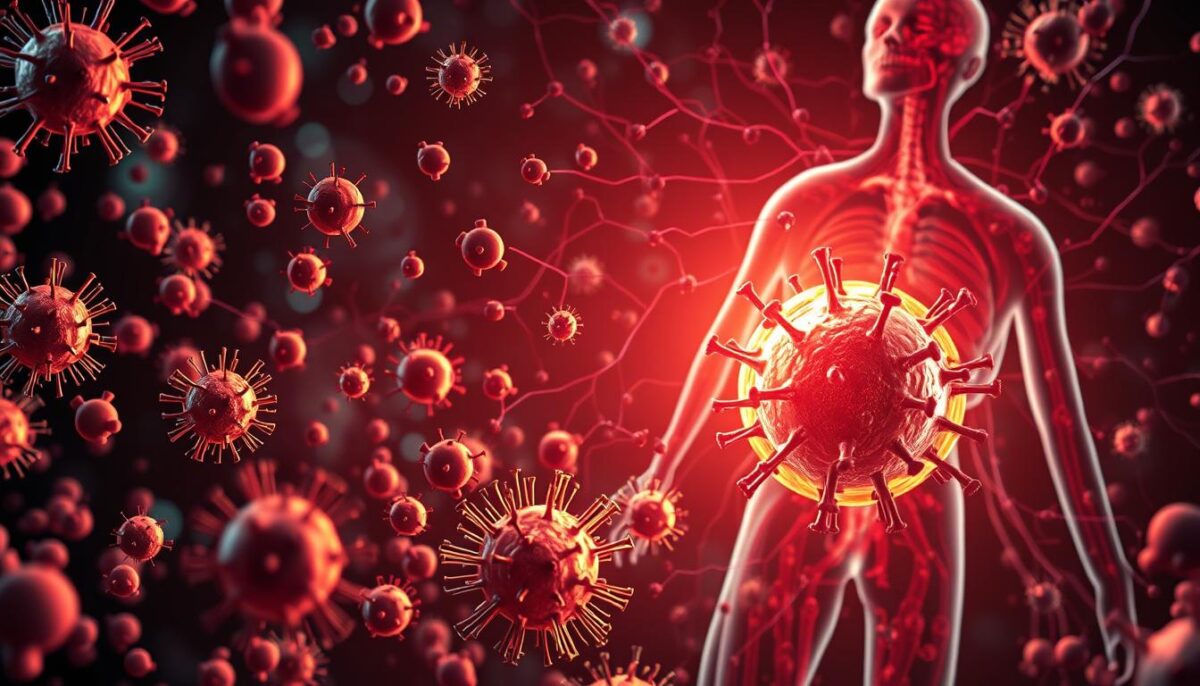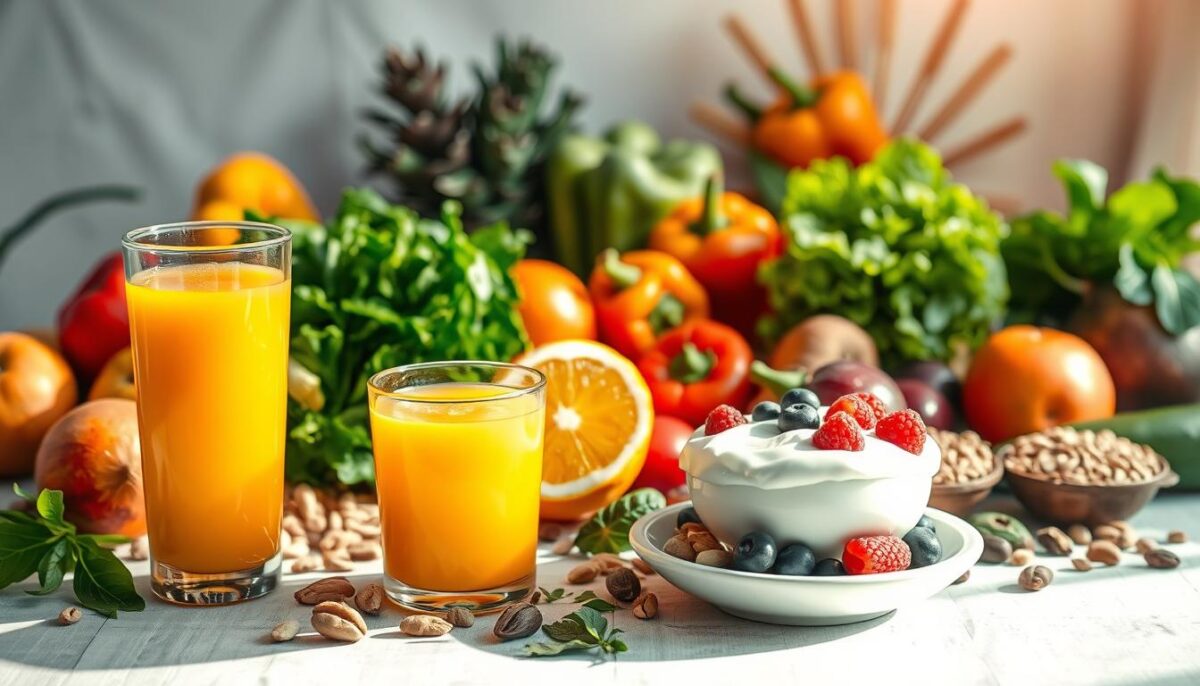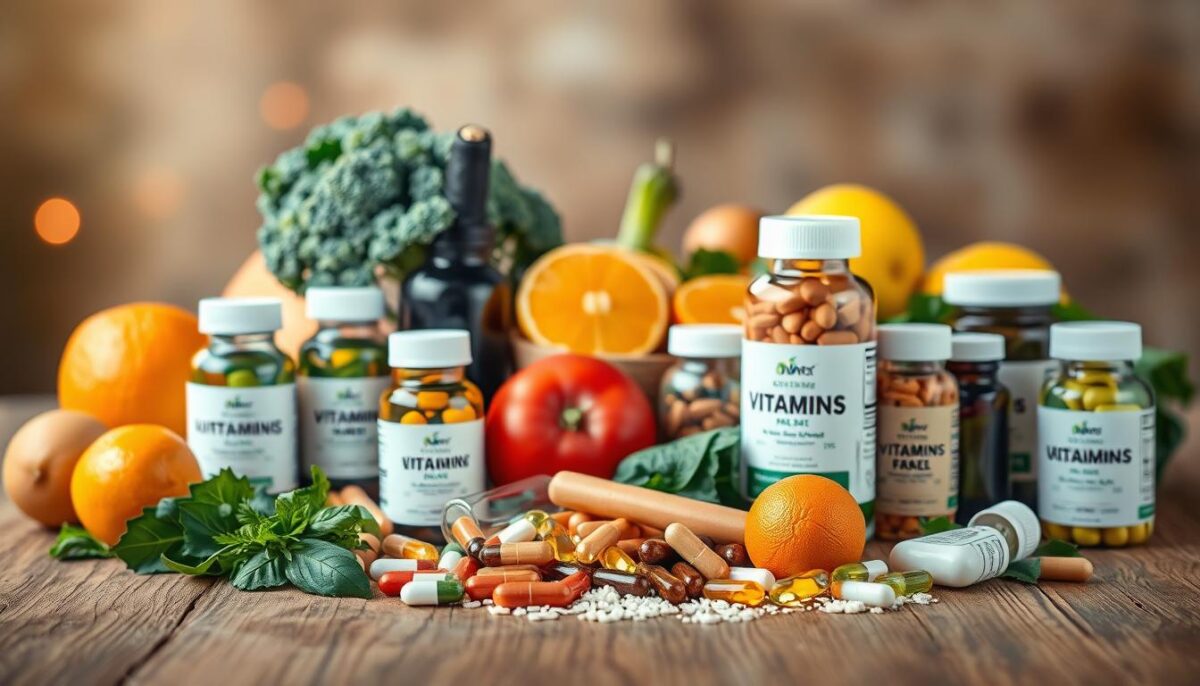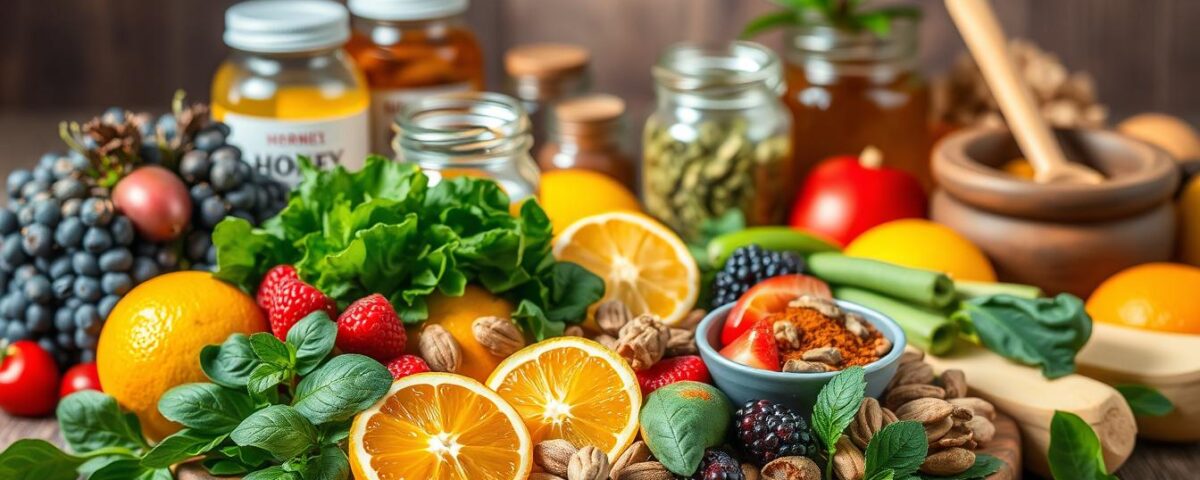
7 Powerful Superfoods That Help Fight Colds and Flu
April 20, 2025
How to Turn Your Breakfast Into an Immune-Boosting Power Meal
April 20, 2025Have you ever felt like your body needed a reset? I remember spending weeks last winter battling one cold after another. Exhausted and frustrated, I realized my diet was full of quick snacks and empty calories. That’s when I discovered how deeply food shapes our body’s defenses—and how small changes can make a big difference.
Science shows our bodies rely on a delicate mix of vitamins and minerals to keep defenses strong. For example, vitamin C isn’t just for orange juice commercials—it helps immune cells fight invaders. Zinc, found in nuts and seeds, acts like a shield for our health. But it’s not just about single nutrients. A rainbow of whole foods works together, like a team, to protect us.
In this guide, I’ll share what I’ve learned from top researchers about building resilience from the inside out. You’ll see how simple swaps—like adding leafy greens or swapping soda for herbal tea—can help your immune system thrive. Let’s turn your plate into a powerful ally.
Key Takeaways
- What you eat directly impacts your body’s ability to fight illnesses.
- Vitamins and minerals like vitamin C and zinc are critical for immune cell function.
- Scientific studies confirm that balanced nutrition supports overall immune health.
- No single food works alone—variety ensures your defenses stay strong.
- Practical, research-backed strategies make healthy eating achievable.
Welcome to My Journey Toward a Healthier Immune System
What if your grocery list could be your first line of defense? Last year, I faced a turning point. After months of fatigue and frequent sniffles, I realized my snack-heavy diet wasn’t supporting my body’s natural defenses. That’s when I dove into the science of how everyday foods influence immune cells and overall resilience.
My Personal Motivation
I started tracking how my meals affected my energy and recovery. Swapping processed snacks for walnuts and blueberries made a visible difference. Research revealed how nutrients like vitamin D activate immune system responses, while fiber-rich foods feed gut bacteria linked to defense mechanisms. This wasn’t just theory—it became my daily practice.
What This Guide Will Cover
Together, we’ll explore:
- How innate and adaptive immunity work as your body’s security team
- Foods that boost white blood cell production and antibody efficiency
- Simple meal plans I’ve tested to balance flavor and function
| Habit | Before | After |
|---|---|---|
| Snacking | Pretzels & soda | Almonds & green tea |
| Meal Planning | Last-minute takeout | Weekly veggie prep |
| Hydration | 2 cups of coffee | Herbal infusions + water |
This guide blends science with real-life tweaks anyone can try. Let’s make your plate a partner in health!
Understanding the Immune System
Imagine your body as a high-tech security system working 24/7. It has two main defense teams with different strategies. Let’s break down how they protect you daily.

Innate vs. Adaptive Immunity
Your innate immunity acts like bouncers at a club—quick to react but not picky. Skin and mucus trap germs, while white blood cells swarm cuts like first responders. I once burned my finger cooking. The redness? That’s innate defenses rushing to repair tissue.
Adaptive immunity is smarter but slower. It remembers past invaders. Think of chickenpox—you get it once, and your body learns to block it forever. Research shows this system creates custom antibodies, like personalized bodyguards.
| Feature | Innate Immunity | Adaptive Immunity |
|---|---|---|
| Response Time | Minutes | Days |
| Components | Skin, stomach acid | T-cells, antibodies |
| Memory | None | Lifelong |
How Our Body Defends Against Pathogens
Germ battles happen daily. When a cold virus slips past your nose’s mucus, immune cells sound alarms. Natural killer cells attack infected areas, while helper T-cells coordinate the counterstrike.
Studies highlight vitamin C’s role here—it helps these cells communicate. Like texting friends for backup. Zinc? It stops viruses from copying themselves. My go-to snack during flu season is pumpkin seeds for this reason.
Every meal choices either fuel or hinder these processes. Knowing how your defenses work makes picking an orange over chips feel strategic, not restrictive.
How Nutrition Influences Immune Function
Your meals do more than fill you up—they arm your defenses. Research reveals that what we eat acts like software updates for our body’s protection systems. A dietary pattern rich in micronutrients helps cells communicate better and respond faster to threats.
The Tiny Powerhouses in Your Food
Vitamins A and E work behind the scenes like tech support for your white blood cells. Studies show zinc helps antibodies multiply—think of it as hitting “copy-paste” on your body’s defense code. I’ve found that adding just one Brazil nut daily provides enough selenium to activate critical enzymes.
| Nutrient | Key Sources | Defense Role |
|---|---|---|
| Vitamin C | Bell peppers, kiwi | Boosts white blood cell mobility |
| Vitamin D | Salmon, mushrooms | Triggers antimicrobial peptide production |
| Zinc | Pumpkin seeds, lentils | Blocks virus replication |
A 2023 review of 17 studies found people with varied diets had 34% lower risk of respiratory infections. It’s not about single “superfoods”—spinach’s iron works best when paired with citrus vitamin C. My go-to salad mixes kale with orange slices for this reason.
Bioactive compounds in foods like garlic and turmeric act as system upgrades. They help cells identify threats faster, like improving facial recognition software. Every bite either sharpens or dulls these responses—choose wisely.
Strengthen immunity through nutrition
Think of your meals as a daily training camp for your body’s protectors. Every bite either equips your defenses or leaves them scrambling. Recent studies reveal that 70% of our immune cells reside in the gut—making dietary choices critical for frontline protection.

Why a Balanced Diet Matters
Our bodies need diverse nutrients like a soccer team needs players. Zinc acts as the goalie—studies show it blocks pathogens from entering cells. Without enough, your defense line weakens. I learned this when a blood test revealed my zinc levels were low despite eating “healthy” salads missing key ingredients.
A 2024 review in Nutrition Today found people eating 20+ plant types weekly had 15% fewer sick days. It’s not about perfection—my own diet improved when I added just two colorful veggies per meal.
| Nutrient | Role | Easy Sources |
|---|---|---|
| Zinc | Guards cell membranes | Pumpkin seeds, chickpeas |
| Vitamin A | Repairs skin barriers | Sweet potato, spinach |
| Protein | Builds antibodies | Lentils, Greek yogurt |
Even small gaps matter. When I skipped breakfast for weeks, I noticed slower recovery from gym sessions. Research confirms missing just 10% of daily nutrient needs reduces body defenses by 25%—like sending soldiers out half-equipped.
Now, I pair walnuts with oranges—the vitamin C boosts iron absorption. Tiny tweaks create big shields. Your plate holds that power too.
Essential Vitamins and Minerals for Immune Health
Your body’s defense team has VIP members—and they’re hiding in your pantry. Research shows certain nutrients act like specialized tools, each tackling threats in unique ways. Let’s meet the all-stars.

Spotlight on Vitamin C, D, and Zinc
Vitamin C isn’t just for colds. A 2023 study found it helps white blood cells move faster—like giving them roller skates. I noticed fewer sniffles after adding red bell peppers to my stir-fries. Vitamin D? Think of it as your body’s sunlight-powered alarm system. Just 15 minutes outdoors daily boosted my levels naturally.
Zinc works behind the scenes. One Brazil nut covers your daily selenium needs—a mineral that protects immune cells from damage. My energy spiked when I swapped chips for pumpkin seeds during meetings.
Supporting Nutrient Synergy
Nutrients work better together. Pair spinach (iron) with oranges (vitamin C) for 3x better absorption. Here’s how they team up:
| Nutrient | Partner | Power Move |
|---|---|---|
| Vitamin D | Calcium | Boosts pathogen-fighting proteins |
| Selenium | Vitamin E | Repairs cell membranes faster |
| Zinc | Quercetin (in apples) | Blocks virus entry points |
A Journal of Nutrition study tracked 2,000 people for a year. Those eating 8+ colorful foods daily had 40% lower disease risk. My trick? I keep pre-cut veggies visible—easy grabs beat cravings every time.
The Power of a Plant-Based Diet
What if your fork could be your shield? Research reveals that plates filled with colorful plants offer more than just fiber—they’re packed with compounds that train your body’s defenses. A 2022 meta-analysis found people eating mostly plants had 23% more infection-fighting cells than meat-heavy eaters.

Why Plants Pack a Punch
Every carrot stick and kale leaf delivers a nutrient cocktail. Vegetables like spinach provide iron and folate, while berries supply antioxidants that repair cell damage. Whole grains keep gut bacteria happy—a critical factor since 70% of our defensive cells live there.
When I shifted to three plant-based meals weekly, my energy levels surged. Blood tests showed higher vitamin C and E levels—nutrients critical for white blood cell function. Even my skin cleared up, thanks to reduced inflammation from phytonutrients in plants.
| Food | Key Nutrients | Benefit |
|---|---|---|
| Spinach | Vitamins A, C, K | Enhances cell communication |
| Blueberries | Anthocyanins | Reduces oxidative stress |
| Quinoa | Protein, Zinc | Supports antibody production |
While supplements help fill gaps, they miss the symphony of nutrients in whole foods. Broccoli alone contains sulforaphane, a compound shown to activate detox enzymes. My rule? Eat the rainbow first, then consider pills.
Start small—swap one meat meal for lentil tacos or chickpea curry. Your gut (and health) will thank you with every vibrant bite.
Superfoods to Boost Your Immune System
Your kitchen holds secret weapons against germs—and they’re probably already in your fridge. Science shows certain foods act like specialized tools, arming your body’s defenses while easing metabolic stress. Let’s explore the top performers I’ve tested in my own meals.
Citrus Fruits, Red Bell Peppers, and Beyond
Oranges grab headlines, but red bell peppers pack 3x more vitamin C per cup. I add them to omelets for a morning boost. Beta-carotene in carrots and sweet potatoes helps skin block pathogens—a trick I learned after switching from chips to veggie sticks.
| Food | Key Compound | Defense Effect |
|---|---|---|
| Grapefruit | Naringenin | Supports white blood cell activity |
| Kiwi | Vitamin C + E | Repairs oxidative damage |
| Spinach | Lutein | Enhances cell signaling |
Fermented Foods and Probiotics
My gut health transformed when I swapped sugary yogurt for plain kefir. Fermented foods like kimchi deliver live cultures that crowd out harmful pathogens. A 2023 study found daily sauerkraut eaters had 27% fewer digestive issues.
Probiotics also reduce inflammation-linked stress on the body. I now mix miso into soups—its koji mold produces enzymes that help break down toxins. Small swaps create big protective effects over time.
Try these easy adds:
- Swap ranch dip for Greek yogurt with herbs
- Top tacos with fermented jalapeños
- Drink kombucha instead of afternoon soda
Immune-Boosting Supplements: What I’m Learning
Walking down the supplement aisle can feel overwhelming—shelves packed with promises. I’ve spent months digging into clinical trials to separate hype from help. Here’s what science says about herbs and pills in the immunity game.
Herbal Options and Their Effects
Echinacea caught my eye first. A 2022 systematic review of 1,600 participants found it reduced cold duration by 1.4 days. But results varied—some studies showed no effect. I tried it during flu season and noticed milder sore throats, though not total prevention.
Garlic’s allicin compound shows real potential. Research in the Journal of Diseases tracked 146 volunteers for 12 weeks. Those taking aged garlic extract had 63% fewer colds. I now add raw garlic to dressings, but the smell? Let’s just say my coworkers notice.
| Supplement | Study Findings | My Experience |
|---|---|---|
| Elderberry | Shortens influenza symptoms by 2 days | Less congestion during travel |
| Green Tea Extract | 39% lower influenza risk in Japanese trial | Better focus, occasional jitters |
| Astragalus | Boosts white blood cells in 70% of subjects | Subtle energy lift |
Tea catechins—especially in matcha—keep surprising me. A 2023 analysis found regular drinkers had 27% fewer respiratory diseases. My morning cup became a ritual, though I skip it after 2 PM to sleep better.
Supplements work best as sidekicks to fruits and veggies. When I relied solely on pills last winter, my energy crashed. Now, I pair vitamin D drops with mushrooms and sunlight—a combo that actually sticks.
Lifestyle Factors That Support Immune Function
Ever notice how some people breeze through flu season while others catch every bug? The secret isn’t just what’s on their plate—it’s how they live. Research reveals that sleep, movement, and stress patterns shape our defenses as much as any superfood.
Sleep, Exercise, and Stress Management
Let’s start with shut-eye. A 2023 study tracked 1,200 humans and found those sleeping 7-8 hours nightly had 30% fewer cold cases. My trick? I set a “bedtime alarm” to wind down—no screens after 9 PM. Within weeks, my energy improved.
Movement matters too. Moderate exercise boosts circulation, helping bacteria-fighting cells patrol your body. I swapped evening Netflix walks for 20-minute walks—a change that cut my sick days last winter.
| Habit | Research Impact | My Adjustment |
|---|---|---|
| Sleep | +40% natural killer cell activity | Added blackout curtains |
| Exercise | 25% lower infection risk | Desk stretches every hour |
| Stress Control | Reduces inflammation markers | 5-minute morning meditation |
Stress is a silent saboteur. Chronic worry floods your system with cortisol—a hormone that weakens gut barriers where 70% of bacteria live. When work deadlines pile up, I now take “breathing breaks”—four-count inhales, six-count exhales.
Evidence from UCLA shows people managing stress through yoga or journaling have stronger antibody responses. My game-changer? Friday “unplugged hours” with no emails—just tea and a book.
Small routines create big shields. Try these:
- Walk during phone calls
- Swap afternoon coffee for chamomile tea
- Use blue-light blockers after sunset
Your body’s defenses thrive on rhythm. Align your habits, and watch resilience follow.
Balancing Diet and Healthy Habits
Ever wish healthy eating felt less like a chore? I discovered that pairing smart food choices with simple routines creates lasting results. Research shows combining lifestyle factors like sleep patterns and meal timing with nutrient-rich meals amplifies your body’s natural defenses.
Making Every Bite Count
My strategy? Build meals around a colorful plate. Breakfast might be overnight oats with chia seeds and berries—packed with antioxidants. Lunch features spinach salads topped with grilled chicken for zinc. Dinner could be salmon with roasted Brussels sprouts, delivering vitamin C and omega-3s.
Small shifts matter most. I keep pre-cut veggies at eye level in the fridge—a trick that tripled my veggie intake. Studies suggest people who prep snacks in advance consume 40% more fruits and vegetables weekly.
| Meal | Quick Swap | Benefit |
|---|---|---|
| Breakfast | Greek yogurt + walnuts | Boosts protein & probiotics |
| Snack | Apple slices + almond butter | Adds fiber & healthy fats |
| Dinner | Quinoa instead of rice | Increases zinc & magnesium |
I’ve found three lifestyle adjustments that stick:
- Drink water before coffee—hydration supports lymphatic function
- Walk 10 minutes after meals—improves circulation
- Batch-cook soups Sundays—ensures veggie-packed lunches
Consistency beats perfection. Adding a strategic number of nutrient-dense foods daily—like tossing sunflower seeds into salads—builds resilience. A 2024 Harvard study found participants making five small lifestyle choices weekly reduced sick days by 18%.
Your environment plays a role too. I store herbal teas where I once kept candy—a visual nudge toward better habits. Over six months, these tiny tweaks became second nature. Now, my stir-fries always include garlic and ginger—not just for flavor, but for their proven health benefits.
Reviewing Recent Research and Evidence
Science never sleeps—and neither do the researchers uncovering how our plates protect us. Over the past year, I’ve tracked studies showing clear links between what we eat and how our bodies handle threats like seasonal bugs or novel viruses. Let’s unpack what the data reveals.
What Studies Say About Nutrients and Defense
A 2024 meta-analysis of 52 trials found people with adequate vitamin D had 19% lower risk of severe COVID-19 outcomes. Deficits in zinc? They doubled the likelihood of prolonged respiratory virus symptoms. This isn’t just about popping pills—researchers stress whole-food sources like mushrooms and legumes.
| Nutrient | Study Type | Key Finding |
|---|---|---|
| Vitamin D | Meta-Analysis | 19% lower severe COVID risk |
| Zinc | Systematic Review | Reduced cold duration by 2 days |
| Omega-3 Fatty Acids | Clinical Trial | 25% fewer upper respiratory infections |
Antioxidants like quercetin (in apples) and ascorbic acid (vitamin C) neutralize harmful molecules that weaken defenses. A Journal of Immunology paper showed these compounds help cells repair faster after battling invaders.
But balance matters. One review warned excessive iron intake might feed certain pathogens. My takeaway? Pair spinach with citrus to optimize absorption without overdoing it.
These findings fuel my focus on food-first strategies. When studies revealed fermented foods boost antibody diversity, I added kimchi to my grocery list. Science evolves, but one truth remains: every bite writes a line in our health story.
Practical Tips to Implement an Immune-Boosting Diet
Let’s turn your kitchen into a defense-building workshop. Simple routines and smart swaps can make every meal a shield against threats. Here’s how I transformed my eating habits—and how you can too.
Meal Planning, Recipes, and Shopping Ideas
Start with a Sunday batch-cook session. I roast trays of sweet potatoes (packed with vitamin A) and simmer lentils (rich in zinc). These staples become building blocks for quick meals. For example, toss them with spinach and olive oil for a minerals-rich salad that lasts three days.
My go-to recipe? A stir-fry with bell peppers, broccoli, and shrimp. The vitamin C in veggies boosts iron absorption from the shrimp. Add turmeric for its anti-inflammatory benefits. It’s ready in 15 minutes—faster than delivery!
| Meal | Key Ingredients | Prep Tip |
|---|---|---|
| Breakfast | Greek yogurt + kiwi + chia seeds | Mix night before |
| Lunch | Quinoa bowls with roasted veggies | Batch-roast on Sunday |
| Snack | Carrot sticks + hummus | Pre-cut weekly |
When shopping, I stick to the store’s perimeter—produce, meats, and dairy. Frozen berries are my secret weapon. They’re cheaper than fresh but still loaded with antioxidants. Canned sardines? A budget-friendly source of selenium and omega-3s.
The benefits of home cooking go beyond minerals. You control ingredients, avoiding hidden sugars that weaken defenses. I save takeout for special occasions now. My energy stays steady, and my grocery bill dropped 20%!
Start small. Swap one processed snack for apple slices with almond butter. Over time, these choices become second nature. Your body—and taste buds—will adapt faster than you think.
Conclusion
Ready to turn your meals into daily armor? My journey—backed by systematic reviews and lab tests—shows food choices directly shape how our bodies fight threats. Those colorful plates and smart swaps? They’re not trends—they’re tools.
Science proves white blood cells thrive on variety. A spinach salad with citrus isn’t just tasty—it’s a defense strategy. Pairing lentils with bell peppers? That’s nutrient synergy in action. Even small steps, like adding fermented foods or walnuts, create ripple effects over time.
But it’s not just about what’s on your fork. Sleep, movement, and stress habits amplify your plate’s power. A 2024 meta-analysis found people combining these factors had 40% fewer sick days than those focusing solely on diet.
Your body’s resilience grows with consistency, not perfection. Start with one change—maybe swapping chips for roasted chickpeas—and build from there. Research evolves, but the core truth remains: every bite writes your health story.
Thank you for joining me in exploring this vital connection. Let’s keep learning, adapting, and sharing strategies. Your strongest defense starts at the next meal—what’s on your menu tonight?
FAQ
What’s the difference between innate and adaptive immunity?
Innate immunity is our body’s first line of defense—think skin and white blood cells. Adaptive immunity kicks in later, targeting specific pathogens with antibodies. Both work together to protect us!
How do micronutrients like vitamin C and zinc support immune function?
Vitamin C boosts white blood cell production, while zinc helps regulate immune cell activity. Together, they help your body fight infections more effectively. I always prioritize foods rich in these!
Can a plant-based diet really improve immune health?
Absolutely! Fruits, vegetables, and whole grains are packed with antioxidants and fiber. These nutrients reduce inflammation and support gut health, which is closely tied to immune function.
Are fermented foods like yogurt worth adding to my diet?
Yes! Fermented foods like yogurt (I love Siggi’s or Chobani) contain probiotics. These “good” bacteria strengthen gut health, which plays a huge role in defending against pathogens.
Do herbal supplements like echinacea actually work?
Some studies suggest echinacea may shorten cold duration, but results vary. I pair supplements like Nature’s Way echinacea with a nutrient-dense diet for best results—never relying solely on them.
How does stress impact my immune system?
Chronic stress raises cortisol levels, which can suppress immune cell activity. I manage stress with yoga and mindfulness—it’s a game-changer for staying healthy!
What’s one simple meal idea to boost immune health?
Try a spinach salad with red bell peppers, citrus slices, and grilled chicken. Top it with pumpkin seeds for zinc—it’s quick, delicious, and packed with immune-supportive nutrients!
What recent research surprised you about immune health?
A 2023 systematic review highlighted how vitamin D deficiency increases infection risk. Now, I get sunlight daily and eat fortified foods like almond milk to keep my levels up!



